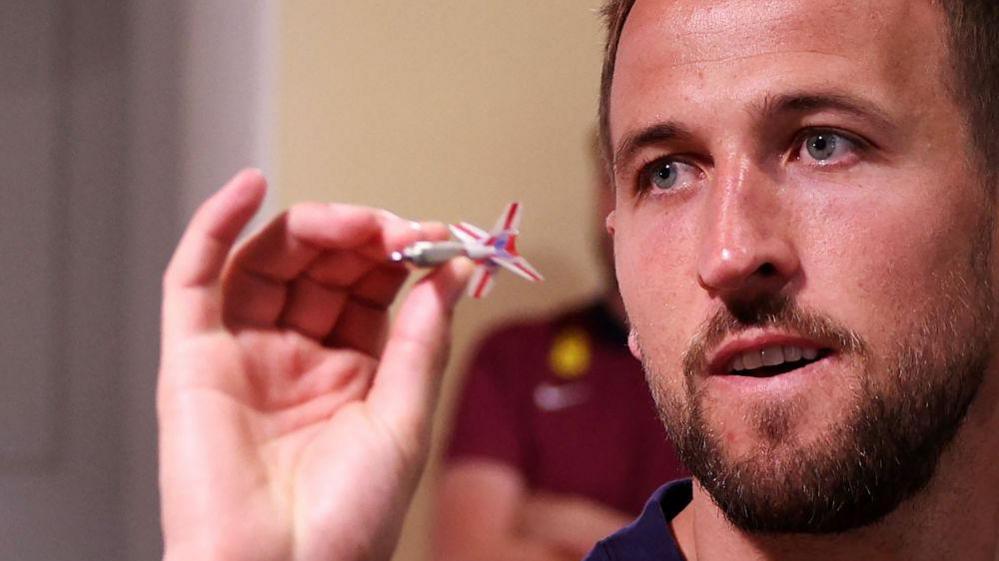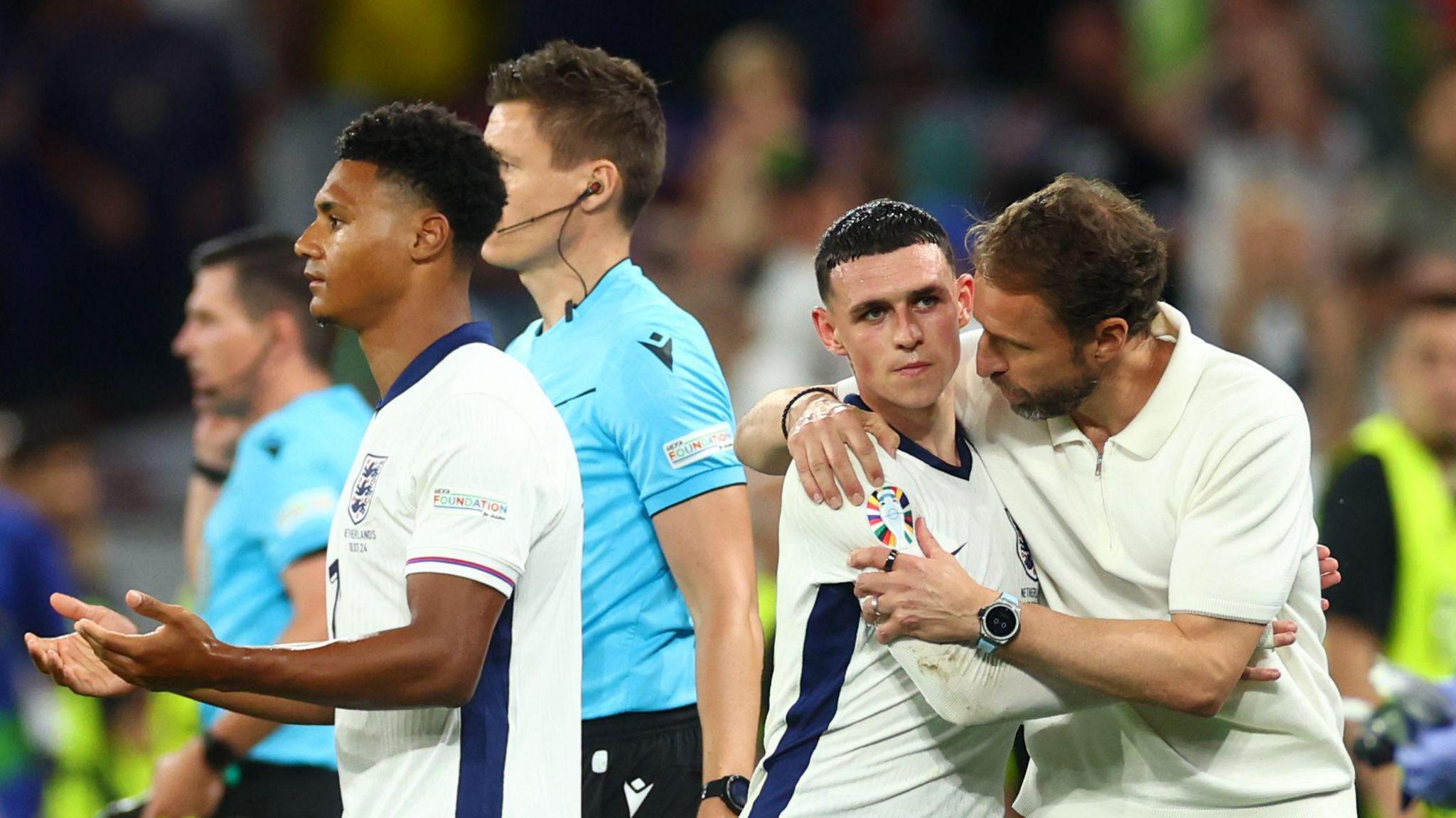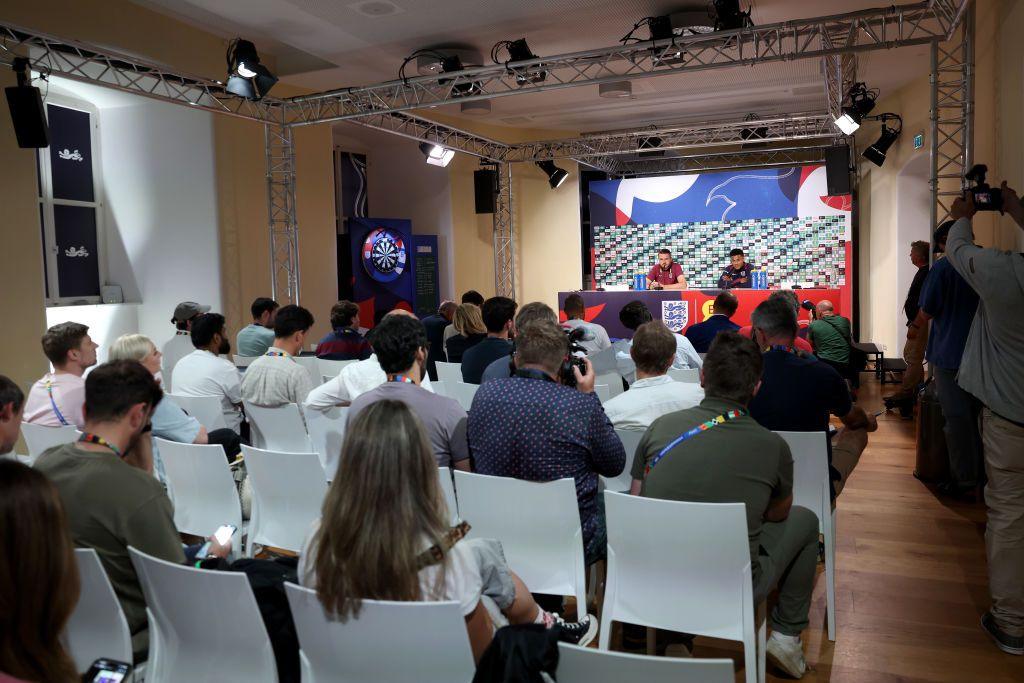From Blankenhain to Berlin - inside the England camp with our BBC experts

England players took part in more than 50 media commitments during their stay at the five-star Weimarer Land Spa and Golf resort in Blankenhain
- Published
An overhauled, younger, less experienced England squad "inhibited" by their own winning expectations; being held together by a "resilient" manager "hurt" by abuse and relying on his core group of "leaders".
Then momentum shifted for a "stubborn, headstrong" Gareth Southgate, with the squad "growing and evolving" by harnessing a "siege mentality".
Four BBC experts give us their insight from inside the England camp on their "rocky, steep" journey to the Euro 2024 final.
'Different' feeling to this England camp
Euro 2024: I'm determined to make it special - Kane
Kelly Somers is BBC Sport's England camp TV reporter:
This camp has still been really good, as all are under Gareth, but it has felt different to previous tournaments for a number of reasons.
The squad is a lot younger with less tournament experience. Of course there was a lot made of the fact there was no Harry Maguire, and England lost big characters in Jack Grealish and James Maddison.
I think people - including myself at first -perhaps underestimated how much this group has evolved even from the Qatar World Cup 18 months ago.
I would also say it feels like during this camp the group as a whole have been on more of a journey than ever before.
It felt at the beginning that perhaps the expectation and noise was weighing heavy - despite the players telling us it wasn't. I actually admired how they were consistent in their messaging in interviews, because they clearly were talking about how to deal with it internally.
I also think there was a lot of internal pressure and expectation.
They did not hide the fact they were coming here to win - they were explicit and I actually wonder if at first that stifled them a little bit. Gareth said he had a bigger job of at times being overly positive with them to reinforce they were on track.
I actually think he and the senior players in the squad had a harder job of binding together because there were so many new faces and new experiences - but it now feels like England are a squad that I believe are closer than ever.
BBC Radio 5 Live football correspondent John Murray:
I speak to the squad the day before a match, with Southgate and a player that England put up for interview - and then post-match. I have noticed that they have leaned very heavily on the experienced players.
Twelve have been at three or more major tournaments so it is the experienced men that have been put in front of the cameras and the microphones.
I think that has helped in terms of spreading the load so the younger players have not always been involved.
- Published13 July 2024
- Published13 July 2024
- Published13 July 2024
Early frustration of fringe players
Ivan Toney - I kept my focus and played my part
BBC Sport's England news reporter Alex Howell:
Since Gareth Southgate has been manager morale and good feeling in the England camp has been one of the most important parts of his success.
But for the first time there had been a possibility that after a couple of much-criticised performances, the good feeling was starting to be peeled away.
BBC Sport was told by one player's camp that after the Denmark game there was a belief among some members of the squad that the fringe players who had not played - such as Anthony Gordon, Cole Palmer, Kobbie Mainoo and others - could have made a difference to performances and the difficulties the team were having.
And there had been concerns there were a lack of personalities in the England squad. Former England international Conor Coady - working as a pundit for BBC Radio 5 Live - was asked to visit the England camp. He did not go - but he did visit the dressing room after the game against Denmark.
But all that started to change after Jude Bellingham's dramatic overhead kick in the 95th minute against Slovakia which galvanised the group.
In Germany, the players continued to show a united front, speaking positively about their spirit, and seemed to build a siege mentality against everything that was being said by the media and supporters.
There had also been a pointed joined-up message from the camp throughout the tournament. The phrase "we choose our destiny" or "in control of our destiny" was used multiple times after the second group game.
Southgate’s light-hearted anecdote about a "disgusted" Ivan Toney coming on as a 94th-minute substitute with England 1-0 down against Slovakia in the last-16 tie and heading out of Euro 2024, perhaps showed that in the hard moments relationships were growing and that it was only possible with the new players having experienced tournament football for the first time.
One source also said Southgate had made a point of popping up in the background of video calls when backroom staff were calling home and encouraged players to do the same to continue to build that feeling of unity.
'Southgate did not want to admit abuse was hurting'
We all want to be loved - Gareth Southgate
Kelly Somers:
I get the feeling he closed himself off from [the criticism], he did not want to admit it was hurting. But because he had had that release of the Switzerland game, and maybe he felt better about the team, he felt like he could be a bit more open about himself.
He has told me so many times that he has been doing the job long enough and been through enough in his life to know what constitutes success. He knows all the other complexities of the job, and while he definitely wants to be loved, it will not define him.
If I watch an interview back from say Euro 2020, I think he has changed - but for the better. As a manager you can be a nice person, but you have to have that hard edge. And it infuriates me that people do not think he has that. He is smart, and he will use it when he needs to.
Someone described him to me as being "spiky" earlier in the tournament. I would never say he is spiky, but I would say perhaps this time he has been more direct at times and less forgiving of poor questions - and I actually respect that.
John Murray:
Gareth is remarkably consistent in terms of temperament whenever I speak to him, which I have over the course of the past eight years and almost all of the matches he has done.
In the early weeks of this tournament I did detect a tiny little bit more of tension about him I would say, but no more than that. The way England have come through the knockout rounds and the nature of it have seen that pressure release.
I think before the Netherlands match, when we spoke to him in Dortmund's stadium the night before, that is the lightest I have seen him in terms of mood. That is not to overplay it - he has always got a smile, he has always got perspective.

Southgate and his team are looking for their first silverware since 1966
BBC Radio 5 Live & Football Daily podcast presenter Steve Crossman:
"Gareth being Gareth, he hasn’t made it about him", Phil Foden told me in the build-up to the semi-final. That is true of everything he does apart from his approach to criticism - he has desperately tried to make that all about him, shielding his players as a result.
That willingness to throw himself to the wolves is how he has averted the threat that he warned about earlier in the tournament, that danger of players no longer enjoying it, no longer enjoying being away with England and no longer enjoying the weight of the badge - the danger of the bad old days.
- Published12 July 2024
- Published14 July 2024
- Published13 July 2024
'Headstrong', 'resilient' and 'stubborn' Southgate – but he 'must have had doubts'

One of many news conferences where the media interviews England players
Kelly Somers:
Gareth is so headstrong. He always uses the word "resilience" when he talks about his team, but I think he is so resilient too.
He has said a few times this tournament when talking about the abuse he has had, "fortunately, I’ve been through a lot in my life that has made me be resilient; I’m fortunate I've had these experiences that enable me to block stuff out".
I do not believe from what he has said that he has blocked stuff out, but I believe he has really good coping mechanisms and that will be the same if England do not win.
He knows what the public expects and he also knows that there are so many different opinions. He has been around football long enough to know that we are all very reactionary in the moment - but there has to be some degree of reflection that he has changed English football.
John Murray:
Gareth talked of the frustration that his team selections have come out, particularly the switch of formation for the Switzerland game.
As he said post-match, for that to come out three days before the game and to flag it to the opposition riled him in a way you do not normally see. There was certainly tension, but when I say tension, I am talking Gareth Southgate tension.
When you look at his consistency of selection - I think nine players have started all of the six matches so far - there is a determination, there is a stubbornness. He has been steadfast that this is his team, that this team will get him deep in the tournament.
My feeling is that when it was not clicking, when England were not getting the performances - and they still have not put in a complete performance - I think there would have been doubts.
Players have remained open and fun with the media

England also did their own, more informal in-house media on their YouTube channel, including the Diary Room and Lions' Den where players would be more relaxed and compete in various challenges
Steve Crossman:
Making England fun again was definitely the central mission statement when Gareth Southgate took England to his first major tournament in 2018, and it is something the England manager has hinted was at one stage in jeopardy here in Germany.
But six years later, that tradition survives.
I have sat down with several England players within the walls of their Blankenhain Castle media hub, and not once have they tried to pull up the drawbridge.
Despite the criticism, despite the noise, they are as open now as they were on day one when Ivan Toney joked to me he would get a tattoo of the Euros trophy on his face should they go all the way and win it.
Anthony Gordon has explained his love of reading self-help books, and how unlikely siblings' chess and boxing have influenced him.
We have been given a window into the diverse backstories of England's heroes, from Ezri Konsa's description of communication and life lessons from his Angolan mother and his father, who comes from Democratic Republic of Congo, to Bukayo Saka's Yoruba Nigerian heritage, his name means Added Joy - of course it does.
Then there was Cole Palmer telling us about his father and grandfather, a proud member of the Windrush generation, who came to the UK from St Kitts and Nevis.
There is no hint of trepidation, no sign of discomfort in front of the many cameras. Six years have gone by, but you would not know it has been more than two seconds, aside from a new cast of characters joining the squad.
There is no doubt some people will judge Gareth Southgate's tenure on what happens on Sunday, but his players will not.
The 'wolf' game is over, but who will win?
Euro 2024: Bellingham explains England goal celebration against Serbia
Kelly Somers:
I go back to the word resilience. I have never heard a more fitting word for the manager and for the group - and I have never seen a group change and evolve as much as I have over the course of this tournament.
This team thrives on rewriting history. This is a team that has grown, that is ready for anything and anyone. I think - and hope - they are ready one more time to prove people wrong.
John Murray:
Since Qatar, nothing less than winning the thing was going to be good enough for Gareth Southgate.
Over the course of the past six weeks it has had that feeling that this is the last chapter. I think that brings a pressure all of its own.
He knows that some people felt he made the wrong decisions in the course of the Euros final in 2021 but he said something along the lines of "it's just as well we've got another chance to put it right this time".
Alex Howell:
Gareth Southgate has been asked a couple of times whether England are the new Germany - with the ability to not play well but find a way to win.
There has definitely been a feeling around the camp when I have been at the Blankenhain daily that the team is peaking at just the right time.
There was belief from the beginning in the England squad that the team had the potential to go far in the tournament.
In fact, their in-house game of ‘The Traitors’, based on the BBC programme, which involved 36 members of players and backroom staff could only be finished once the squad had reached the latter stages of the competition.
One of the backroom members of the Football Association staff planned the game, based on the BBC show, and involved 36 members of players and England staff.
The squad played the game every night apart from days before matchdays and the matchdays themselves, so it did not interfere with preparations but took it seriously, with debates about who was a 'wolf' or 'traitor' taking place around a firepit area in the team's hotel.
There were eight 'traitors' in the group, and those who were culled by the traitors were told when a letter was pushed under their door, with it printed and written in a style similar to the popular game show.
The squad's finale was made even more special when they received a video message from presenter Claudia Winkleman.